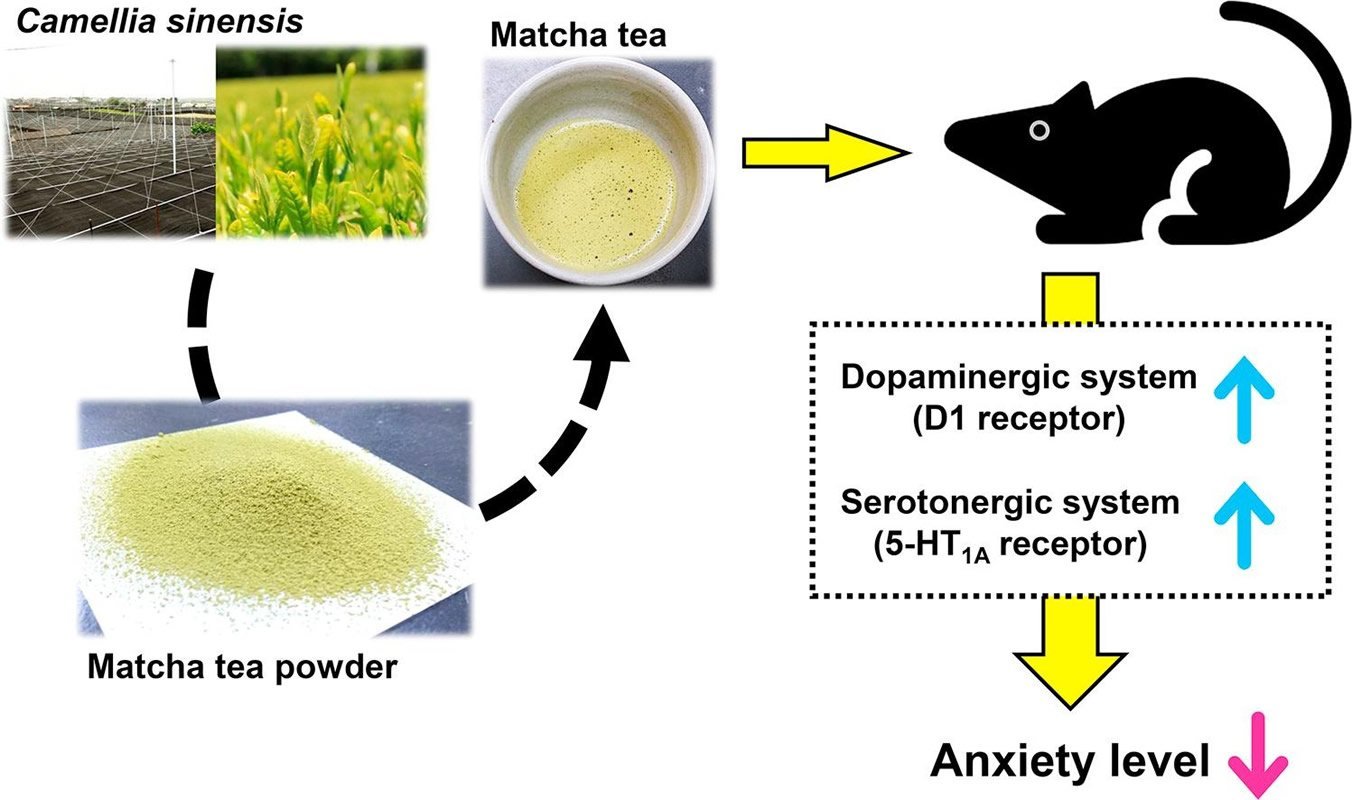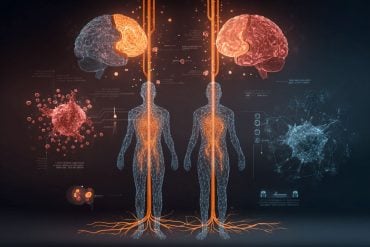Summary: Matcha tea can help reduce anxiety, a new study reports. Mice given Match extract showed a reduction in anxious behaviors. The calming effects are a result of Matcha activating dopamine and serotonin receptors.
Source: Kumamoto University
Many different countries have a tea culture, and Japanese Matcha tea is growing in popularity around the world. In Japan, Matcha has a long history of being used for various medicinal purposes. It has been suspected to have various beneficial effects on health, but relatively little scientific evidence supported that claim. Now, a group of Japanese researchers from Kumamoto University has shown that anxious behavior in mice is reduced after consuming Matcha powder or Matcha extract. Its calming effects appear to be due to mechanisms that activate dopamine D1 receptors and serotonin 5-HT1A receptors, both of which are closely related to anxious behavior.
Matcha is the finely ground powder of new leaves from shade-grown (90% shade) Camellia sinensis green tea bushes. The tea (and food flavoring) is enjoyed around the world. In Japan, historical medicinal uses for Matcha included helping people relax, preventing obesity, and treatment of skin conditions. The researchers, therefore, sought to determine its various beneficial effects.
The “elevated plus maze” test is an elevated, plus-shaped, narrow platform with two walled arms that provide safety for the test subject, typically a mouse. It is used as an anxiety test for rodents with the idea that animals experiencing higher anxiety will spend more time in safer walled-off areas. Using this test, researchers found that mouse anxiety was reduced after consuming Matcha powder or Matcha extract. In addition, when the anxiolytic activity of different Matcha extracts was evaluated, a stronger effect was found with the extract derived using 80% ethanol in comparison to the extract derived from only hot water. In other words, a poorly water-soluble Matcha component has stronger anxiolytic effects than a component that is easily soluble in water. A behavioral pharmacological analysis further revealed that Matcha and Matcha extracts reduce anxiety by activating dopamine D1 and serotonin 5-HT1A receptors.

“Although further epidemiological research is necessary, the results of our study show that Matcha, which has been used as a medicinal agent for many years, may be quite beneficial to the human body,” said study leader, Dr. Yuki Kurauchi. “We hope that our research into Matcha can lead to health benefits worldwide.”
Source:
Kumamoto University
Media Contacts:
J. Sanderson & N. Fukuda – Kumamoto University
Image Source:
The image is credited to Kurauchi, Y et al.
Original Research: Open access
“Anxiolytic activities of Matcha tea powder, extracts, and fractions in mice: Contribution of dopamine D1 receptor- and serotonin 5-HT1A receptor-mediated mechanisms”. Kurauchi, Y. et al.
Journal of Functional Foods. doi:10.1016/j.jff.2019.05.046
Abstract
Anxiolytic activities of Matcha tea powder, extracts, and fractions in mice: Contribution of dopamine D1 receptor- and serotonin 5-HT1A receptor-mediated mechanisms
Matcha is thought to be beneficial for brain functions; however, only a few scientific studies have shown the effects of Matcha tea powder on psychiatric behavior. Here, we evaluated the anxiolytic activity of Matcha tea powder, and its hot water extract (CSW) and ethanol extract (CSE) in mice, using the elevated plus maze test. Oral administration of Matcha tea powder and CSE exerted anxiolytic effects. CSE was further fractionated into hexane soluble (CSEH), ethyl acetate soluble (CSEE) and water soluble (CSEW) fractions. Among the fractions, CSEE and CSEH exerted anxiolytic effects. Moreover, SCH23390, a dopamine D1 receptor blocker, and WAY100135, an antagonist of the serotonin (5-hydroxytryptamine: 5-HT) 1A receptor, prevented Matcha tea powder and CSEE from exerting their anxiolytic effects. These results suggest that Matcha tea powder exerts anxiolytic effect through the activation of the dopaminergic and serotonergic systems.






